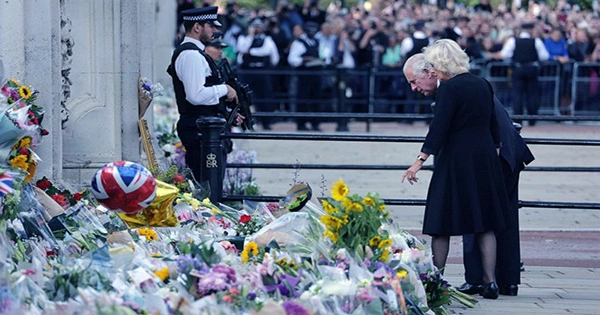When the King or Queen of England passes away, a number of things happen. Prior to the start of the official 10-day period of mourning, which is jam-packed with ritual and procedure, the Prime Minister receives a phone call informing them that “London Bridge has fallen”—a code used to inform them that the monarch has passed away.
The bees are eventually alerted at some point in this period.
The royal beekeeper visits the hives on the grounds of Buckingham Palace and Clarence House to place black ribbons on the hive and warn the bees of the Queen’s passing, as has been customary for generations.
“You ring each hive and tell the bees to stay put since the mistress is dead. You’ll have a decent master who cares for you.”
Instead of the waggle dances that bees like, the message is delivered to them in English.
Surprisingly, the practice of “telling the bees” is not exclusive to the Royal Family and is instead a long-standing beekeeping ritual practiced all over Europe. Superstition demanded that when a member of the owner’s family passed away, the bees should be informed and placed “into mourning.”
The 1899 book The Honey-makers said of the subject, “In Yorkshire, the bees are welcomed to the burial,” when it may be argued that their attendance (unaware of the concept of funerals, never alone how to act at them) would only result in unnecessary chaos.
As one reverend discovered at the turn of the 19th century, bees were believed to die off or produce less honey if they were not notified of a family member’s death (and occasionally on occasions like marriages).
He related to the author of A book about bees that an “old lady” in this parish, whose husband had recently passed away, was “ready to put her bees in mourning” until I dissuaded her by demonstrating how absurd the notion that the bee could comprehend anything about the loss was.
The bees perished during the following winter.
Directly or to music, as the expression suggests, the bees are instructed “The mistress is no longer alive, but stay put. You’ll have a good master in your master “there once. Even though it lost part of its solemnity, the tradition made it to America.
A mountaineer in the Carolina mountains at the turn of the 20th century said, “You knock on each hive and say ‘Lucy is dead’.”
The practice’s origins are unknown, although it is hypothesized that they may have been inspired by Celtic mythology, according to which the sighting of a bee after a death indicates that the soul has left the body. In Western Europe and the United States, the practice peaked in the 18th and 19th centuries before waning.
Although it is obviously pointless to try to educate your cat about Robin Williams or a flan about Armistice Day, some beekeepers still follow the custom of having a guy slowly walk from bee to bee informing them of the Queen’s passing.
















